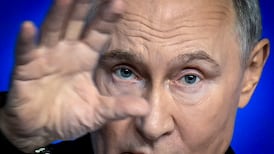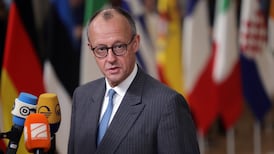Iran and six world powers reached a breakthrough deal early today to curb Tehran's nuclear programme in exchange for limited sanctions relief, in what could be the first sign of an emerging rapprochement between the Islamic state and the West.
Aimed at ending a dangerous standoff, the agreement between Iran and the US, France, Germany, Britain, China and Russia was clinched after more than four days of tortuous negotiations in the Swiss city of Geneva.
Halting Iran’s most sensitive nuclear work, it was designed as a package of confidence-building steps to ease decades of tensions and confrontation and banish the spectre of a Middle East war over Tehran’s nuclear aspirations.

But Israel has denounced it as a "bad deal" and said it would not be bound by it.
US secretary of state John Kerry today sought to reassure skeptics in the US Congress who worry that the six-month agreement gives Iran too much leeway and that it might end up using it as a stalling tactic. Mr Kerry told CNN that US officials entered into the deal with their eyes "absolutely wide open".
EU foreign policy chief Catherine Ashton, who has been coordinating talks with Iran on behalf of the major powers, said it created time and space for talks aimed at reaching a comprehensive solution to the dispute.
"This is only a first step," Iranian foreign minister Mohammad Javad Zarif told a news conference.
“We need to start moving in the direction of restoring confidence, a direction in which we have managed to move against in the past.”
Hard-pressed by sanctions, many Iranians were elated by the easing of tensions and prospect of economic improvement. US president Barack Obama said that if Iran did not meet its commitments during a six-month period, the US would turn off sanctions relief and “ratchet up the pressure”.
UN secretary-general Ban Ki-moon warmly welcomed the interim agreement and urged the governments concerned “to do everything possible to build on this encouraging start”.
But Israel was unhappy. “This is a bad deal. It grants Iran exactly what it wanted - both a significant easing in sanctions and preservation of the most significant parts of its nuclear programme,” an official in prime minister Benjamin Netanhayu’s office said.
Israeli officials however stopped short of threatening unilateral military action that could further isolate the Jewish state and imperil its alliance with Washington, saying more time was needed to assess the agreement.
The West fears that Iran has been seeking to develop a nuclear weapons capability. The Islamic Republic denies that, saying its nuclear programme is a peaceful energy project.
The US said the agreement halted progress on Iran’s nuclear programme, including construction of the Arak research reactor, which is of special concern for the West as it could yield potential bomb material. It would neutralise Iran’s stockpile of uranium refined to a fissile concentration of 20 per cent, which is a close step away from the level needed for weapons, and calls for intrusive UN nuclear inspections, a senior US official said.
Iran has also committed to stop uranium enrichment above a fissile purity of 5 per cent, a US fact sheet said. Refined uranium can be used to fuel nuclear power plants -
Iran’s stated goal - but also provide the fissile core of an atomic bomb if refined much further.
Diplomacy with Iran was stepped up after the June landslide election of Hassan Rouhani, a relative moderate, as Iranian president in June, replacing bellicose Mahmoud Ahmadinejad.
Mr Rouhani’s policy of “constructive engagement” with the outside world aims to get sanctions lifted.
He has the crucial backing of Supreme Leader Ayatollah Ali Khamenei, keeping powerful hardline critics at bay.
On a Twitter account widely recognised as representing Mr Rouhani, a message said: “Iranian people’s vote for moderation & constructive engagement + tireless efforts by negotiating teams are to open new horizons.”
“Ultimately, it is the Iranian people and the American people who deserve the most credit. Both are responsible for this initial victory by rejecting defeatists who said that a brighter future was not possible (and) diplomacy could not succeed,” said Trita Parsi, president of the National Iranian American Council (NIAC) think-tank.
But many obstacles remain, he said. “Hardliners in both countries will work harder than ever to sabotage this pivot towards a diplomatic path.
Those whose only currency is confrontation will search for any opportunities they can find to undermine and sabotage this interim deal.” For now though, many Iranians were joyful.
A post in Farsi by Zarif announcing the deal on his Facebook page received 47,979 “likes” in two hours. There was an outpouring of gratitude and many described him as a “national hero”.
“Dear Doctor Zarif ... Your efforts have filled the hearts of the whole nation with happiness,” wrote Shayrin Shamshirband. “I am writing this comment with my eyes filled with tears. Thank you for everything ... After many years, you have returned happiness to the people. You have restored hope in our hearts and pride in my country,” commented Mehrnoosh Mohebi.
The Geneva deal does not recognise an Iranian right to enrich uranium and sanctions would still be enforced, the US official said. But Iranian deputy foreign minister Abbas Araqchi said
Iran's enrichment programme had been officially recognised. US secretary of state John Kerry said the agreement would make it harder for Iran to make a dash to build a nuclear weapon and would make Israel and other US allies safer.
Mr Kerry also told a news conference that while Mr Obama would not take off the table the possible use of force against Iran, he believed it was necessary first to exhaust diplomacy.
He said the limited sanctions relief could be reversible. After Ms Ashton read out a statement on the deal at the United Nations office in Geneva, ministers appeared elated.
Ms Ashton and Mr Kerry hugged each other, and Mr Kerry and Russian foreign minister Sergei Lavrov shook hands.
“The approximately $7 billion in relief is a fraction of the costs that
Iran will continue to incur during this first phase under the sanctions that will remain in place,” the White House said.
“The vast majority of Iran’s approximately $100 billion in foreign exchange holdings are inaccessible or restricted.”
Mr Kerry and the foreign ministers of the five other world powers joined the negotiations with Iran early yesterday as the two sides appeared to be edging closer to a long-sought preliminary agreement.
Agencies















